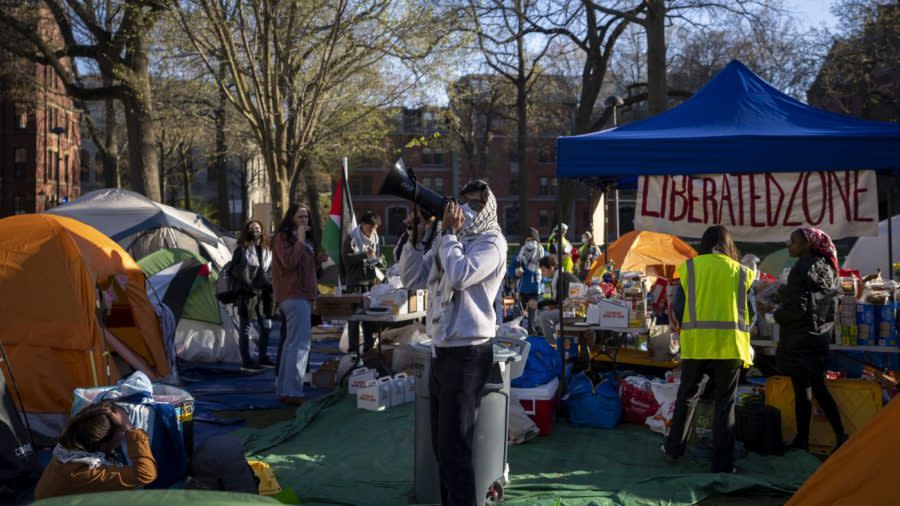Colleges, singed by Israel debate, back away from hot-button issues

As colleges grapple with how to recover from the Israel-Hamas controversies on their campuses, some have decided the best way forward is to try to back away from hot-button issues.
This week, Harvard University and Syracuse University both announced new policies saying school leadership will no longer be commenting on controversial political issues.
The move, which is drawing both derision and cheers, reflects a long-running debate over the role of leading academic institutions.
“I think it’s kind of a nice line in the sand,” said Beth Akers, a senior fellow focused on higher education at the American Enterprise Institute. “So much of the energy, resources were caught up in this sort of statement making, I think was misguided. I’m really pleased with the stuff from Harvard.”
The nation’s oldest university made the decision a month after establishing an Institutional Voice Working Group, which concluded in its report that the school voicing a stance on political issues makes “it more difficult for some members of the community to express their views when they differ from the university’s official position.”
The school, however, is trying to distance itself from the general concept of institutional neutrality.
“The purpose of the university is to pursue truth. In that pursuit, the university as an institution can never be neutral, because we believe in the value of seeking truth through open inquiry, debate, and weighing the evidence, as opposed to mere assertion or unjustified belief,” the report reads.
Harvard has previously shown support for the Black Lives Matter movement, flown a Ukrainian flag over the Harvard Yard and released statements regarding the Israel-Hamas war.
The concept of institutional neutrality became popular in the 1970s after the University of Chicago put out the Kalven Report, which largely came to the same conclusions as Harvard’s new one.
“The idea is that the university is not really capable in our conception of taking positions on issues of the day. It’s not the job of the university to be a moral authority. It’s the job of the university to be a place for faculty and students to debate the issues of the day, but it doesn’t itself have a position,” said Tom Ginsburg, faculty director of the University of Chicago’s Forum for Free Inquiry and Expression.
“It’s funny because Harvard tried to pretend that their position is really distinct, but the end result is the same, and I think it’s a good one,” Ginsburg added.
Stephanie Hall, acting senior director of higher education policy at the Center for American Progress, said that while she supports schools finding ways to foster free expression, she is concerned Harvard’s policy was brought on by outside influences and worries about how it may be implemented.
“We’d hate to think that with any kind of neutrality policy that universities are hamstringing their ability to engage with the political or the economic forces that impact them,” Hall said.
“My initial reactions to some of this was, well, how are we defining controversial? How are we defining public policy issues? How do you determine what issue isn’t core to the school’s mission and thus worthy of an official position?” she added. “I think all of these things alone could be up for debate. How well this works on the ground is really going to be reliant on how thoughtful leadership and administration are in sorting out the details.”
Universities have been in hotbeds of political controversy throughout the academic year, with House Republicans holding multiple hearings with the heads of elite schools regarding antisemitism and their policies surrounding free expression and harassment in the wake of Hamas’s Oct. 7 attack on Israel and the subsequent war in Gaza.
Those hearings contributed to the resignation of Harvard’s and the University of Pennsylvania’s presidents, both of whom came before the pro-Palestinian student encampment protests that dominated the end of the semester.
Ginsburg said it is important to remember the Kalven Report offers general principles and that the University of Chicago has spoken out when issues could directly affect it or its mission, such as when its then-leader released a statement denouncing former President Trump’s “Muslim ban.”
“And as far as I know, no one inside the university criticized him for that. I think we all agreed that that was an appropriate exception, because it threatened our mission,” Ginsburg said.
One of the more common demands of protesters who took over parts of dozens of campuses nationwide was for their college to release statements condemning the war in Gaza.
But Syracuse, one of the universities that saw such an encampment, became the second school this week to adopt a policy of not commenting on controversial issues, saying it will only happen “under the most extraordinary circumstances.”
The committee charged with creating the new policy spent four months on the initiative, with Chancellor Kent Syverud saying the result “reinforces our steadfast commitment to the principles of free expression and free inquiry to ensure free speech and academic freedom flourish.”
“I think that it’s a shift for schools to adopt because they have previously put out statements on various political matters,” said Laura Belts, director of policy reform at the Foundation for Individual Rights and Expression. “So when a school does decide to adopt institutional neutrality, it will need to explain to its campus community why it’s making this change and who is deciding that it will no longer put out those sorts of statements and to assure students that they will be moving forward with this in a principled manner, and that it’s not just something they’re adopting because of the current conflict.”
Copyright 2024 Nexstar Media, Inc. All rights reserved. This material may not be published, broadcast, rewritten, or redistributed.
For the latest news, weather, sports, and streaming video, head to The Hill.


